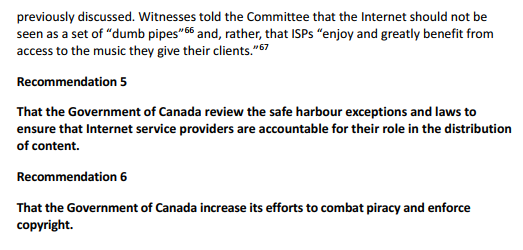Canadian Parliamentary Report Proposes Tough Copyright Measures

To this end, Canada’s Heritage Committee organized several hearings on remuneration models for artists, where it received input from various stakeholders.
The outcome provides input for the Committee on Industry, Science and Technology’s broader review, which will determine the future course for Canada’s copyright policy. The Heritage Committee hopes that its findings will be included.
The report, titled “Shifting Paradigms,” leads to a set of 22 recommendations. These cover a variety of issues ranging from addressing the value gap and holding ISPs accountable, through limiting fair dealing, to extending the copyright term.
These themes are in large part meant to further support creators and copyright holders. Much like the EU’s copyright reform, there is a lot of emphasis on the so-called value gap, i.e the notion that artists don’t currently receive fair compensation for their work.
This is also reflected in the report. For example, the payouts at streaming services such as Spotify are often seen as too low. Similarly, services such as YouTube can distribute music and profit from it, while only paying a small fee to copyright holders.
“The inability of policy to evolve with technology has prevented artists from receiving fair market value for their work. According to witnesses, these outdated rules have diverted wealth from creators to large digital intermediaries on which artistic content is consumed,” the committee writes.
There are also rightsholders who have highlighted the possible aspects of technology on their industries. Content creators have many new distribution platforms, for example, which can bring in extra revenue. However, it’s clear that creators can use some guidance, which results in the first recommendation.
Recommendation 1: That the Government of Canada increase its support for creators and creative industries in adapting to new digital markets.
Online piracy in general is another major theme. Torrent sites and streaming sites remain a significant problem which is hard to address, for example. In addition, ISPs currently have little incentive to help combat piracy.
One issue that the Government will look into is whether safe harbor exceptions for ISPs should change, to make these companies accountable for pirating users under certain circumstances.
Recommendation 5: That the Government of Canada review the safe harbor exceptions and laws to ensure that Internet service providers are accountable for their role in the distribution of content.
More generally, the report also suggests that Canada should do more to tackle online piracy overall. One of the options, as suggested during the consultation, is to criminalize online streaming.
Recommendation 6: That the Government of Canada increase its efforts to combat piracy and enforce copyright.

The recommendations are mostly meant to strengthen the position of rightsholders. This also includes an extension of the copyright term from 50 to 70 years after the creator’s death. This follows requests from several copyright groups and is in line with the new trade agreement with the US and Mexico.
According to the committee, no witnesses expressed outright opposition to extending of the copyright term, which leads to the following recommendation.
Recommendation 7: That the Government of Canada pursue its commitment to implement the extension of copyright from 50 to 70 years after the author’s death.
Large copyright intermediaries are also presented with a setback, which appears to have been largely initiated by Canadian singer Bryan Adams. During a hearing last year, Adams suggested changing the text of the Copyright Act to made it easier for artists to regain their copyrights.
At the moment, Canadian copyright reverts to a creator’s heirs 25 years after “death.” By changing the word “death” to “assignment”, creators will be able to terminate a copyright assignment while they’re still alive.
This is helpful to artists who sign away their rights to labels early in their career, which they may regret later. The Heritage Committee sides with Adams and includes the following recommendation.
Recommendation 14: That the Government of Canada amend subsection 14(1) of the Copyright Act so that it reads “from 25 years after assignment.
Following more music- and movie-related recommendations, many of which deal with licensing and remuneration, the committee shifts its focus to the publishing industry.
Specifically, it addresses a commonly heard complaint from publishers that Canada’s fair dealing exemptions are too broad. Currently, schools are allowed to copy texts for educational use, but this should change, the committee argues.
Recommendation 18: That Government of Canada amend the Act to clarify that fair dealing should not apply to educational institutions when the work is commercially available.
All in all its clear that the recommendations made in the report are favorable to copyright holders, who will welcome it with open arms. However, not everyone is positive.
University of Ottawa professor Michael Geist, who has followed the developments closely, describes the report as the most one-sided Canadian copyright report issued in the past 15 years.
“Representing little more than stenography of lobbying positions from Canadian cultural groups, the report simply adopts as recommendations a wide range of contentious proposals: copyright term extension, restricted fair dealing, increased damages, as well as several new rights and payments,” Geist writes.
“There is no attempt to engage with a broad range of stakeholders, much less grapple with contrary evidence or positions.”
While the Heritage committee did hear several witnesses from people with contrasting views, such as Professor Jeremy de Beer, lawyer Howard Knopf, and author Cory Doctorow, these positions were not reflected in the final report.
The Heritage Committee’s recommendations will now be reviewed by the Standing Committee on Industry, Science and Technology, which is tasked the broader copyright review. That report is expected to come out later this year.
As such, there’s still a long way to go before any of these proposals are acted upon, if that’s the case at all.
—
A copy of the House of Commons Standing Committee on Canadian Heritage ‘s “Shifting Paradigms” report is available here (pdf).
Source: TF, for the latest info on copyright, file-sharing, torrent sites and more. We also have VPN reviews, discounts, offers and coupons.



TLTR. But it looks like a premium VPN service is what’s required now or soon will be so your ISP won’t know what sites your visiting or who you’re connecting to. Unfortunately, the bigger issue here is what VPN providers one should use. There’s so many variables and obviously, historical trust issues like with IP Vanish.